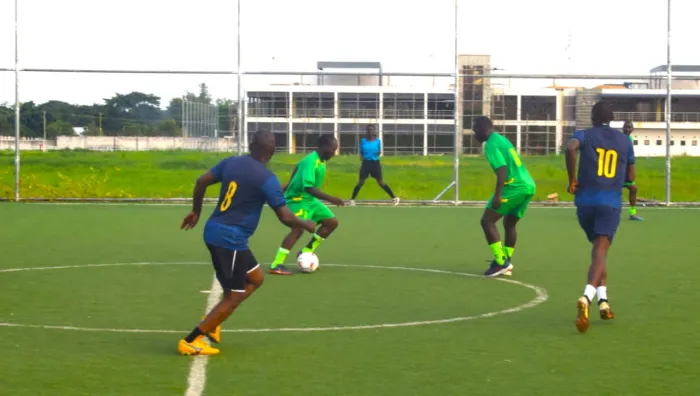ODOGWU In Box 18 : Any Hope For Private Clubs In Nigeria League?

Nigeria's love for football originated from the British, who introduced it at the beginning of the 20th century. By 1950, football had become a national pastime for Nigerians. During the colonial period, football gave the Nigerian people a sense of national pride and inspired them to push for political freedom. In April 1938, Nnamdi Azikiwe, a key figure in Nigerian history, created Zik's Athletic Club (ZAC) in Lagos. This club had equipment and facilities for many different sports and it quickly became a symbol of African self-determination and nationalism. That most probably gave birth to private participation in Nigeria sports today.
By 1960, when Nigeria gained independence from Britain, and eventually became a member of FIFA., Private individuals and corporate bodies were initiated into forming various football clubs. The likes of Iddo Tiger of Lagos, Ikpeazu Redoubtables of Onitsha and many more springed up with the enthusiasm and love for the game. They later became a major source of providing jobs for young people.
When the Nigeria League was established in 1972, there were many clubs owned by Corporate bodies and organizations. When the Nigeria Professional League came into existence in 1990, there were teams like Iwuanyanwu Nationale of Owerri, ACB of Lagos, Julius Berger of Lagos, Stationery Stores of Lagos, Udoji United of Nnewi, Jasper United of Awka among others. Gradually, these clubs were extinguished by the assumed toxis environment of Nigeria Football and the economic downturn of the country.
Recently, private clubs like FC Ifeanyi Ubah, Remo Stars, Sporting Lagos, Doma FC came into the scene, only Remo Stars who had a defined focus could sustain and survive its participation in the league. The Proprietor of FC Ifeanyi Ubah gained the political relevance it wanted, but fizzled out of the league, just like it came like a wide fire. However, Doma FC of Gombe and Sporting Lagos FC could not survive because of faulty foundations. No privately owned team would ever survived with money brought from the "breast pocket" of the owners.
If Private clubs are to survive in the toxic environment of Nigeria Football League, where government clubs are accessible to fat subventions which are never accounted for, they must imbibe certain things which will be enumerated here. This is so because they are supposed to be examples of how football clubs should be run, especially in terms of their unique ownership structure, which allow fans to own shares in the club and participate in its management.
Private clubs in Nigeria face challenges in surviving in the League due to several reasons, including:
1. Financial constraints: Limited funding and resources make it difficult to compete with state-funded teams.
2. Poor infrastructure: Inadequate facilities, training equipment, and medical care hinder team performance and development.
3. Lack of sponsorship: Limited corporate support and sponsorship opportunities restrict revenue generation.
4. Political interference: Government influence and meddling in club affairs can lead to instability and poor decision-making.
5. Talent drain: Top players often leave for foreign clubs, depleting local talent and weakening teams.
6. Poor management: Inexperienced or corrupt leadership can lead to mismanagement and financial misappropriation.
7. Competition from European leagues: Nigerian players and fans often prioritize European leagues, reducing interest and investment in local clubs.
8. Security concerns: Safety issues and violence at matches can discourage fans and sponsors.
9. Limited fan base: Small fan bases and low attendance reduce revenue from gate takings and merchandise sales.
10. Corruption: Unethical practices and corruption within the Nigerian Football scene and clubs undermine the league's integrity and hinder private clubs' growth.
These challenges make it difficult for private clubs to sustain themselves in the Nigeria League, leading many to rely on government support or fold operations altogether.
Private clubs in country can survive and thrive in the Nigeria League if they:
1. Developing a strong brand and identity
2. Building a loyal fan base through engaging marketing and community outreach
3. Securing sponsorships and partnerships with local businesses
4. Investing in youth development programs and grassroots talent scouting
5. Improving infrastructure and facilities through private investment or partnerships
6. Adopting professional management and administrative practices
7. Fostering a strong team spirit and competitive culture
8. Encouraging transparency and good governance
9. Building strategic partnerships with foreign clubs for talent exchange and development
10. Leveraging digital platforms for revenue generation and fan engagement
11. Creating alternative revenue streams through merchandising, hospitality, and events
12. Collaborating with other private clubs to share resources and expertise
By implementing these strategies, private clubs in Nigeria can overcome the challenges and build a sustainable future in the Nigeria League.



Write a Comment